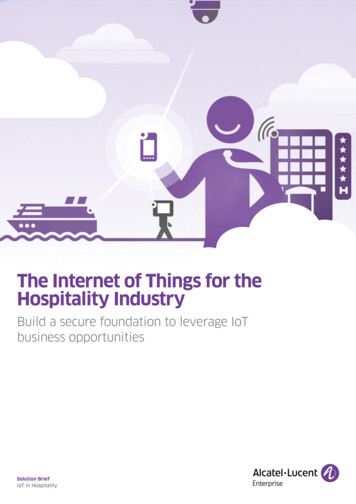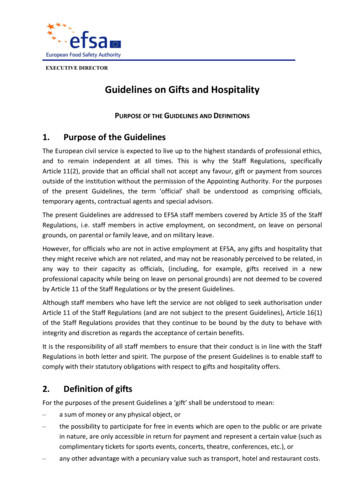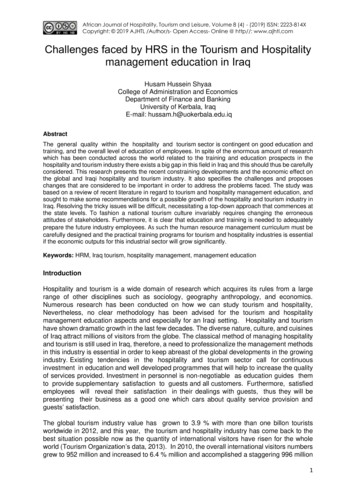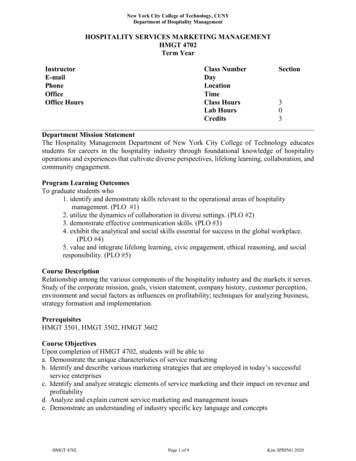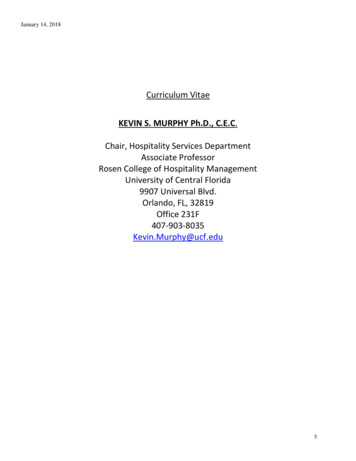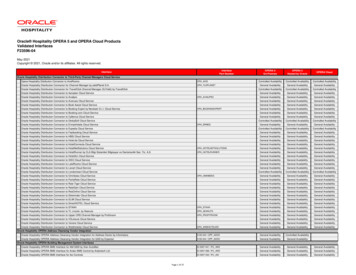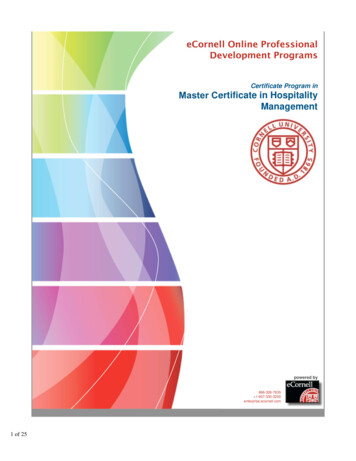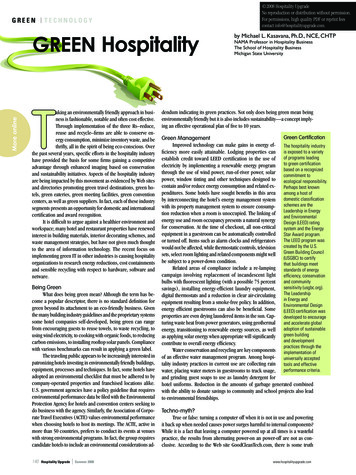
Transcription
GreenTechnologyMore onlineGreen HospitalityTaking an environmentally friendly approach in business is fashionable, notable and often cost effective.Through implementation of the three Rs–reduce,reuse and recycle–firms are able to conserve energy consumption, minimize inventory waste, and bethrifty, all in the spirit of being eco-conscious. Overthe past several years, specific efforts in the hospitality industryhave provided the basis for some firms gaining a competitiveadvantage through enhanced imaging based on conservationand sustainability initiatives. Aspects of the hospitality industryare being impacted by this movement as evidenced by Web sitesand directories promoting green travel destinations, green hotels, green eateries, green meeting facilities, green conventioncenters, as well as green suppliers. In fact, each of these industrysegments presents an opportunity for domestic and internationalcertification and award recognition.It is difficult to argue against a healthier environment andworkspace; many hotel and restaurant properties have renewedinterest in building materials, interior decorating schemes, andwaste management strategies, but have not given much thoughtto the area of information technology. The recent focus onimplementing green IT in other industries is causing hospitalityorganizations to research energy reductions, cost containmentsand sensible recycling with respect to hardware, software andnetware.Being GreenWhat does being green mean? Although the term has become a popular descriptor, there is no standard definition forgreen beyond its attachment to an eco-friendly business. Giventhe many building industry guidelines and the proprietary systemssome hotel companies self-developed, being green can rangefrom encouraging guests to reuse towels, to waste recycling, tousing wind electricity, to cooking with organic foods, to reducingcarbon emissions, to installing rooftop solar panels. Compliancewith various benchmarks can result in applying a green label.The traveling public appears to be increasingly interested inpatronizing hotels investing in environmentally friendly buildings,equipment, processes and techniques. In fact, some hotels haveadopted an environmental checklist that must be adhered to bycompany-operated properties and franchised locations alike.U.S. government agencies have a policy guideline that requiresenvironmental performance data be filed with the EnvironmentalProtection Agency for hotels and convention centers seeking todo business with the agency. Similarly, the Association of Corporate Travel Executives (ACTE) values environmental performancewhen choosing hotels to host its meetings. The ACTE, active inmore than 50 countries, prefers to conduct its events at venueswith strong environmental programs. In fact, the group requirescandidate hotels to include an environmental considerations ad140Hospitality Upgrade Summer 2008 2008 Hospitality UpgradeNo reproduction or distribution without permission.For permissions, high quality PDF or reprint feescontact info@hospitalityupgrade.com.by Michael L. Kasavana, Ph.D., NCE, CHTPNAMA Professor in Hospitality BusinessThe School of Hospitality BusinessMichigan State Universitydendum indicating its green practices. Not only does being green mean beingenvironmentally friendly but it is also includes sustainability—a concept implying an effective operational plan of five to 10 years.Green CertificationGreen ManagementImproved technology can make gains in energy ef- The hospitality industryficiency more easily attainable. Lodging properties can is exposed to a varietyestablish credit toward LEED certification in the use of of programs leadingelectricity by implementing a renewable energy program to green certificationbased on a recognizedthrough the use of wind power, run-of-river power, solarcommitment topower, window tinting and other techniques designed to ecological responsibility.contain and/or reduce energy consumption and related ex- Perhaps best knownpenditures. Some hotels have sought benefits in this area among a host ofby interconnecting the hotel’s energy management system domestic classificationwith its property management system to ensure consump- schemes are thetion reduction when a room is unoccupied. The linking of Leadership in Energyand Environmentalenergy use and room occupancy presents a natural synergy Design (LEED) ratingfor conservation. At the time of checkout, all non-critical system and the Energyequipment in a guestroom can be automatically controlled Star Award program.or turned off. Items such as alarm clocks and refrigerators The LEED program waswould not be affected, while thermostatic controls, television created by the U.S.sets, select room lighting and related components might well Green Building Council(USGBC) to certifybe subject to a power-down condition.that buildings meetRelated areas of compliance include a re-lamping standards of energycampaign involving replacement of incandescent light efficiency, conservationbulbs with fluorescent lighting (with a possible 75 percent and communitysavings), installing energy-efficient laundry equipment, sensitivity (usgbc.org).digital thermostats and a reduction in clear air-circulating The Leadershipin Energy andequipment resulting from a smoke-free policy. In addition,Environmental Designenergy efficient guestrooms can also be beneficial. Some (LEED) certification wasproperties are even drying laundered items in the sun. Cap- developed to encourageturing waste heat from power generators, using geothermal and accelerate globalenergy, transitioning to renewable energy sources, as well adoption of sustainableas applying solar energy when appropriate will significantly green buildingand developmentcontribute to overall energy efficiency.practices through theWater conservation and recycling are key components implementation ofof an effective water management program. Among hospi- universally acceptedtality industry practices in current use are collecting rain tools and effectivewater, placing water meters in guestrooms to track usage, performance criteria.and grinding guest soaps to use as laundry detergent forhotel uniforms. Reduction in the amounts of garbage generated combinedwith the ability to donate savings to community and school projects also leadto environmental friendships.Techno-myth?True or false: turning a computer off when it is not in use and poweringit back up when needed causes power surges harmful to internal components?While it is a fact that leaving a computer powered up at all times is a wastefulpractice, the results from alternating power-on an power-off are not as conclusive. According to the Web site GoodCleanTech.com, there is some truthwww.hospitalityupgrade.com
GreenTechnologyto the assumption that a power surgepresents a potential danger to the device, but there is also a degree of urbanmyth. First, completely powering up ordown a computer will not damage its internal components (e.g., power supply,mainboard, RAM and others) as theyare designed to handle power jolts.However, there may be wear and tearto the hard drive from frequent boot-upsand downs, but most experts perceivethis to be negligible. Industry practitioners claim the best solution may be acompromise employing low-power thatavoids hard drive shock caused by onand off switching. By pre-programmingan automated device to progress to anautomatic time-out condition—sleep orstandby mode—the system avoids thesudden activity associated with powering up while also minimizing energy requirements. Experts warn that even in atime-out mode, the device still draws asmall amount of wattage that over timemay total a significant sum.Green ITWhile green lodging opportunities142Hospitality Upgrade Summer 2008include efficient energy management, earth-friendly cleaningproducts, water conservation,quality indoor air, waste reduction and product recycling, therequirements for technology arenot as straight-forward. Howmuch should hospitality practitioners be concerned aboutthe eco-friendliness of installedinformation technology? Are hospitality firms willing to pay moreto gain eco-centric benefits? Arefirms willing to switch to a vendor with more green technology?More than half the respondents toa recent Forrester survey claimedto want environmentally friendlyproducts, but of those willingadopters, only 12 percent werewilling to pay more for a greenersolution. What can be done tomake hospitality technology applications more environmentallyfriendly? Well, the answer to thisquestion involves a complex set ofinter-related engineering designelements, operational proceduresand presentation of results.Green information technology (IT), sometimes referred to asgreen computing, is a term usedto describe the application of automated resources in an efficientmanner. Green IT originates withsystem manufacturers producingenvironmentally friendly productsand encouraging users to adopteco-friendly practices such asreducing paper usage throughminimal printing, operatingmore efficiently with power management, and exercising properrecycling habits. Although thefield of green technology is inrelative infancy, it encompasses acontinuously evolving toolbox ofmethods and materials, including alternative energy sourcing.As global information technologyenvironmental standards continueto expand, it is highly likely thatguidelines governing product lifespan, power consumption andrecyclable resources will be inthe forefront.Green IT ConcernsSustainability–continuous creationof innovative products and programsto enhance development and expansion of initiatives; involves meetingpresent needs without compromisingthe ability to meet future needs.Recyclability–changing cradle-tograve scenarios to cradle-to-cradleby incorporating products that canbe reclaimed and reused; most agreethat computer parts are amongthe easiest technology items toseparate through a process roducts appear to have a plannedobsolescence (short life expectancy)that often leads to a continuouspattern of production-consumption-discarding and when devicesare constructed of difficult-to-recycle materials, the problems areexacerbated.Powerability–the amount ofelectricity (AC or DC) required forcomputing can be a significant contributor to cost and global warming.Viability–creating activity aroundtechnologies and requisite productsthat benefit the environment.www.hospitalityupgrade.com
GreenTechnologyIT ProductsIn July 2007, for the first time, Energy Starspecifications establishing green criteria for automated devices went into effect. These specificationsapply to a variety of IT products including desktopand notebook computers, hand-held devices, gameconsoles, integrated computer systems, desktop-derived servers and workstations. Qualified productsmust meet energy use guidelines in three distinctoperating modes: active, standby and sleep. Onlythe most energy-efficient computing products areawarded the Energy Star label.The Energy Star approach ensures energy savings when a device is active and performing a range oftasks, as well as when in a standby mode. By requiring efficiency savings across operating modes, thesespecifications are expected to produce significantcost savings while also helping control greenhousegas emissions. Hospitality operators are encouraged to seek the Energy Star label when purchasingelectronic equipment (see qualified product listat: www.energystar.gov/ia/products/prod lists/computers prod list.xls).eWasteThe technology industry is largely self regulated.To date there is no federal law that addresses the issue of end-of-life electronic equipment managementand disposal. Current e-waste legislation includes taxincentives that encourage recycling.through lodging-related operations. Hospitalityproperties should seek to reduce energy, waterusage, and solid waste by installing energy-efficient lighting, low flow fixtures and participatingin recycling programs.The objective of a certification program isto identify those hospitality businesses that exhibitan awareness of sustainability and achieve balanced excellence in at least three critical areas:economic development, social responsibility andstewardship of the natural environment. One ofthe many state and national programs availableto the hospitality industry for environmentallyfriendly certification is the Green Hotel Association (GHA).The GHA (greenhotels.com) encourages,promotes and supports ecological consciousnessin the hospitality industry. GHA defines a green hotel as an environmentally friendly property whosemanagement is eager to institute programs thatsave water, energy and reduce solid waste in anattempt to preserve and protect the earth. Two ofthe association’s better-known strategies includepublication of the “Catalog of Environmental Products for the Lodging Industry” and promotion ofsheet changing cards that requests guests considerreusing linens more than once. While there aremany hospitality properties that participate andpractice green initiatives, here are a few of themore celebrated programs.Green HotelsMany hospitality industry observers claim thatan eco-friendly campaign should include reductionsin greenhouse gas emissions, carbon neutrality,recycling and organic gardening. Green propertiesare encouraged to capture waste heat from powergenerators, use renewable energy sources, and educate guests relative to environmental issues impactedThe Ambrose, Santa Monica, Calif.– As stated on the property’s Web site, “We reduce,reuse and recycle. We compost. We continue tosearch for the most environmentally friendly alternatives in production and clean our guestroomswith the most ecologically responsible productson the market. We support our neighbors andlocal merchants and do our best to promote the"Get me the Green Hospitality IT hotline please and hurry."144Hospitality Upgrade Summer 2008PC Magazine created a suite of standards leading togreen certification based on the following criteria.Performance efficiency–candidate devices undergo a series of passive energy-usage tests that include an idle state, sleep state and system-off state.Energy usage in such passive states is measured asenergy passes through the device’s power brick, anintermediate device located between the PC and itsexternal power source. In addition, an active statetest measuring energy consumption during complexdata processing is also conducted. Recyclability–manufacturer-prescribed steps required to reducewaste and to recycle computerized devices. EcoStandards–each device is tested against externalcompliance Standards leading to an overall evaluation score. It is important to note that RoHS andEnergy Star testing are requirements of the EuropeanUnion and US government. GreenTech rating–acombination of the above factors, plus an index forintangibles such as general impression, provides thebasis for an overall green rating. A machine earning aPC Magazine GreenTech rating is certified as energyefficient and amenable to recycling (see list at: e the scope of information technologyprevalent in a hotel, restaurant, casino or club isextensive, a few of the more common componentsare:Desktop/laptop PC. Energy-efficient desktopPCs were introduced some time ago that, based onconstruction and operation, consistently use lesspower than legacy machines. Recent efforts bymanufacturers have focused on building devicesthat are more energy-efficient, have lower operatingexpenses, and are easier to recycle. Nearly all PCshave been assigned an Energy Star rating.POS/kiosk terminal. Instead of allowingtransaction technology (kiosks, POS terminals,kitchen display units, receipt printers, scanners,readers, etc.) to remain active during low volumeor downtime periods, the devices should be automatically configured to transcend into a standbyor sleep mode.Minibar device. Minibars and in-roomrefrigerators represent an opportunity to reduce electricity costs through expert installation and onlinemonitoring (inventory tracking, temperature alertsand energy costs). Units that operate only whenconditions dictate, typically receive a more favorableEnergy Star rating (e.g., Dometic Zigbee, Minibar’sSmartCube, IHC NuvoPro and MicroFridge).Copier/fax/scanner machines. Copiers,scanners and fax machines are among the mostenergy-intensive office equipment since they tend toremain on for long periods of time (24/7). Energy Starcertified imaging equipment is expected to deliverquality performance at a 25 percent higher level ofefficiency. Devices that power down when not inuse will use about half of the electricity of standardmodels. In addition, products that print double-sidedpages reduce both copying and paper costs. Certifiedproducts also run cooler (air conditioning) and lastlonger (reduced maintenance).UPS (uninterruptable power supply). NewerUPS models are energy efficient and designed toprotect the power going to PCs at a cost that is offsetby energy savings. Effective UPS devices are alsocapable of powering down idle devices for furtherenergy conservation.
GreenTechnologyGreen Factoids: Research indicates that switchedoff devices may account for nearly 40percent of the energy consumed byelectronics in the average workplace. Extra heat generated by automatedequipment increases temperature conditions in an office, thereby increasingdependency on air conditioning andHVAC components. By 2011, more than 400 million PCswill have been purchased as replacements for current home and office computers. Recycles.org provides a listing ofagencies that use old equipment. Recycling 100 million cell phoneswould recover 3.4 metric tons ofgold—gold that would not have to bemined. PCs contain gold too: 1.2 tons ofPC scrap electronics has more than canbe extracted from 17 tons of gold ore.A survey by Staples in November 2007indicated that only 23 percent of U.S.residents recycle electronics. E-waste makes up 2 percent of solidwaste in the U.S. and is the fastestgrowing garbage segment As much as 50 percent of the powermost desktop computers use is wastedas heat jettisoned by fans on the powersupply. If all commuters worked from homejust one day a week, we could save 5.85billion gallons of oil each year.good work they are doing throughout the community. By blendingupscale tranquility with affordableluxury and low impact living practices, we offer our guests a touch oftruly holistic hospitality.” The hotelhas applications in the followinginternal operational areas: energyconservation, water conservation,non-toxic housekeeping practices,waste reduction, alternative transportation, staff and guest awareness,and community service. Unique offerings include: preferred parkingspaces for hybrid vehicles, ‘Herethere and everywhere’ e-newsletter, green meeting planner, andcomplimentary bus passes for hotelemployees. [ambrosehotel.com]things as environmentally friendlycleaning supplies, in-room designerrecycling bins, complimentary organicbeverages, guest towel and linen reuseprogram, energy conserving lighting,flow-restricting water conservationand organic food and beverage honorbar items. In addition, several Kimptonproperties, including The Muse, offerhybrid car incentives for guests drivingto its hotels, as well as arranging pedicabs as eco-transportation alternativesfor local guest commutes. KimptonHotels has made a strong commitment to environmental responsibilityand strives to continuously introducenew initiatives, products and practices through its EarthCare program.[kimptonhotels.com]Kimpton’s The Muse,New York – The mission statement of the Kimpton hotel chainis: “Support a sustainable worldby using non-intrusive, high quality,eco-friendly products and services atall Kimpton hotels.” All its properties are expected to adhere to strictcorporate policies governing suchSeaport Hotel and WorldTrade Center, Boston, Mass.–This property is composed of ahotel, meeting and exhibit space, anda special function facility. Through anaward-winning initiative entitled “Seaport Saves,” this independently ownedentity states its interests this way, “In aworld of limited natural resources, weare committed to reducing the carbonfootprint of our operation. Seaport hascreated Seaport Saves, a groundbreaking environmental program dedicatedto increasing sustainability and conservation throughout all aspects ofthe organization. This philosophyallows us to continually source andexecute innovative ways to improveour operation in an environmentallyresponsible manner. We encourageour guests, team members and vendorsto embrace and practice an environmentally sensitive lifestyle as well. It ispossible to coexist in a delicate balancewith the natural world while providingworld-class service in a luxurious setting.” As a result of this dedication, theproperty adheres to such eco-friendlypractices as: allergy/asthma-friendlyrooms, green cleaning products,ozone-gas laundry services, resourceand in-room recycling, biologicaldecomposing, smart thermostats andtransportation subsidies. A unique offering is the company’s green weddingpackage. This package plan includes acollection of environmentally sensitiveelements. [seaportboston.com]The No-Stress PMS. . . Just learn that your PMS is no longerbeing supported?. . . Frustrated with the high software andhardware costs of upgrading or purchasinga new PMS?. . . Looking for a new PMS that is low cost,easy to learn, easy to use, and easy to train?NOVEXSYS is “The New Standard in Property Management Systems.”It is Web-based software that is sold as a service (SaaS) and operateson any current Windows operating system.Built on the Microsoft.NET Framework, NOVEXSYS requires nonew hardware be purchased. It is easy to buy, easy to install, easy tomaintain, easy to train and easy to use!O Essental PMS FunctionalityO Multi-Property CapabilityO Low Cost of Ownership(972) 793-1730www.novexsys.com146Hospitality Upgrade Summer 2008www.hospitalityupgrade.comNovexsysQuarterAd jg3.indd 15/7/08 1:57:35 P
GreenTechnologyWays Hotels & RestaurantsCan HelpGreen MeetingsHotels claims that bySAVE the PLANET 2017,Marriottit will have installed solar power.Meeting and banquet facilitiesin as many as 40 hotels, while expandingare using pourers for sugar, pitchits recycling program. While 90 percenters for cream and small servingof its hotels currently recycle, only a fewdishes for butter and jellies.of them are recycling in-room guest.A Toronto hotel is recyclingtrash. Marriott is also updating designstained tablecloths into napkins,guidelines for its hotels to meet thechef’s aprons and neckties.Bicycles are being loaned orU.S. Green Building Council’s LEEDrented to guests.standards. The company is also pres.Coins or chips are being usedsuring its suppliers to provide greenerfor car parking and coat checkingproducts. The company said it will orderinstead of paper tickets.47 million of the greener BIC pens a.Hotels are making cloth laundryyear. It is also buying one million roombags from retired sheets.Mowed landscaping is beingready towels, which eliminate the initialreplaced by ground cover.wash cycle, saving 6 million gallons of.A Florida hotel bought a mulcherwater a year. Marriott is also looking intoto chop up their garden clippingsrecyclable carpet and key cards that turnand create their own mulch. Theto compost. Next month, Marriott plansmulcher paid for itself in threemonths.to introduce a green meetings concept.A Wisconsin B&B has installedwhich will feature recycled paper andbeautiful blue floor tile made fromresponsible packaged water, amongrecycled automobile windshields.other things.Chief engineers have found thatGreen meetings, green hotels,toilet tank fill diverters in oldertoilets save about 3/4 of a gallon of green convention centers, green supwater per flush.pliers and international awards for.A Pennsylvania property hasbeing green affect all aspects of thea 400-foot garden and produceshospitality industry. Environmentallyorganically grown vegetables for itsconscious meetings are also a growingrestaurant.trend. The greening of a meeting can be.Restaurants and bars in hotelsare using daylight exclusively for as accomplished in many ways; includingmuch of each day as possible.not pre-filling water glasses at banquet.In tropical areas solar energy istables, collecting name tags and badgelighting signage and heating waterholders for reuse, providing recyclingfor hotels.areas inside exhibition areas, and using compostable cups instead of water bottles. Often meeting plannersinsist on biodegradable and recyclable materials being used by hostsites as part of the selection process. Many industry observers do notconsider green events a fad, but rather a long-term perspective. Theway organizations are doing business, with resources becoming rareand expensive, there is an increased attention to support eco-friendlymeetings. In the tourism sector, green (ecotourism) is considered asource of profitability. Research indicates that more than 60 percent ofmeeting planners deliberately avoid a destination or venue with a poorenvironmental record. In 2003 IMEX introduced the Green MeetingAward and recently partnered with the Green Meeting Industry Councilto launch the Green Exhibitor Award and Green Supplier Award. Greenmeeting leaders claim that being green is not only right for the environment, but actually saves businesses money.By definition, a green meeting incorporates environmental considerations throughout all stagesof the meeting in order to minimize the negaThere is moretive impact on the environment. Basically, ainformation aboutgreen meeting supports a green initiative andGreen IT at ouris expected to save money while improvingWeb site. Go tothe environment. The Convention IndustryhospitalityCouncil (CIC) Green Meetings Report is theupgrade.com/reference for the meeting planning industry,sum08GreenIT.while the EPA’s It’s Easy Being Green documentstipulates mandatory requirements for green meetings. Sustainable TravelInternational works with such industry leaders as InterContinental, Marriott and Leading Hotels of the World to reduce their carbon footprint.Recently, Virginia, California, Michigan, Florida and Vermont initiated theirown certification program for green hotels. The bottom line is that peoplehave become more environmentally aware and have begun basing businessdecisions on environmental factors as well as logistics. The State of Floridais a case in point.The Florida Green Lodging Program was established in 2004 by theFlorida Department of Environmental Protection (DEP) with the intent ofrecognizing and rewarding environmentally conscientious lodging facilitiesin the state. Through this rapidly growing program, DEP has encouragedthe lodging industry to conserve and protect Florida’s natural resources.This program is unique and specific to the Florida environment.The EPA anticipates that its Green Meetings Program will have apositive impact on the hospitality industry. The assumption that the cost tocomply with green upgrades can be more than offset by long-term savingsremains to be documented.AHLA InitiativesSuperior energy management leads to improved financial performance. Starting with low-cost/no-cost opportunities, hoteliers can saveup to 10 percent of energy costs with little or no capital investment. That’ssignificant when one considers that those savings are equivalent to increasing the average daily room rate by 1.35 for full-service hotels and .62for limited-service hotels. Additional measures can save up to 30 percent.The lasting result is clean air.The AH&LA Good Earthkeeping logo and related outreach materials make it easy for participants to communicate energy savings in termsof environmental leadership to guests. With 43 million environmentallyminded travelers, a boosted ecological stewardship image translates intoadditional profits.Global InitiativesThe Global Green Hospitality Consortium (GGHC) was founded toprovide the hospitality industry with the resources needed to implementsustainable standards and practices offered by various green associationsat the local, state and federal levels, including such programs as EPAGreen Partnership, Energy Star and U.S. Green Building Council’s LEEDcertification. GGHC works with a hotel property to develop practical toolsand skilled assistance to facilitate the implementation of sustainable initiatives and compliant standards. The group’s certification program includesrecognition for green best practices. GGHC is wholly owned by the GlobalGreen Energy Consortium (GGEC), a non-profit organization registered inthe state of Delaware. [www.globalgreenhospitality.org]Hospitality’s RoleThe hospitality industry plays a significant role in ecotourism, andtherefore the American Hotel and Lodging Association has proclaimedthe greening of the hospitality industry as its top priority for 2008. TheAHLA recently established a Green Task Force to develop a comprehensivesustainability initiative for existing and newly constructed properties. Byyear-end, the Green Task Force is charged with creating a hotel-centricLEED building certification program, in conjunction with the U.S. GreenBuilding Council.Most industry observers maintain that while going green is the rightthing to do, staying green after the spotlight has faded may well be a biggerchallenge.Michael Kasavana, Ph.D., NCE, CHTP, is a NAMA Professor in Hospitality Business for the School of Hospitality Business at MichiganState University. He can be reached at kasavana@msu.edu. istockphoto/Diane Labombarbe148Hospitality Upgrade Summer 2008www.hospitalityupgrade.com
Energy Star rating (e.g., Dometic Zigbee, Minibar's SmartCube, IHC NuvoPro and MicroFridge). copier/fax/scanner machines. Copiers, scanners and fax machines are among the most energy-intensive office equipment since they tend to remain on for long periods of time (24/7). Energy Star Hospitality Upgrade Summer 2008 Green TecHnoloGy


